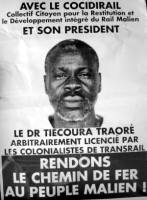Rail Sans Frontière
Railway Privatisation
 In Senegal and Mali, long planned railway privatisation was executed
in October 2003, when the central 1.200 km railway line between
the two countries’ capitals, from Dakar to Bamako, was sold
to the Canadian/French enterprise Transrail.
In Senegal and Mali, long planned railway privatisation was executed
in October 2003, when the central 1.200 km railway line between
the two countries’ capitals, from Dakar to Bamako, was sold
to the Canadian/French enterprise Transrail.
The major profit guided goal of Transrail is more and faster transport
of goods – consequentially a reduced transport of people,
faster trains, and a reduced number of stops along the track. Since
Transrail took over operation of the track, most train stations were
closed down, gravely affecting the local communities
and economies of people living along the track and depending on
the use of the railway for their work and lives.
A second major profit induced goal for any company is of course
to reduce costs, in other words: to exert pressure on wages and
working conditions, and to get rid of part of the workforce –
beginning with union activists and other “troublemakers”.
During the process of privatisation, established unions and company
in perfect harmony negotiated new contracts, giving up on workers’
rights and entitlements that these had achieved by working for the
state owned railway for long years. The new contracts contained
compensation agreements and explicit decisions on who was going
to keep or lose his/her job.
The workers who were fired from their railway jobs in the course
of the privatisation process are called “déflatés”
in French, and this is the name under which, in Senegal,
these workers organise in protest against their firings and against
the process of privatisation as a whole, as Regroupement des Cheminots
Déflatés (RCD).
In Mali, fired workers joined forces with community
groups along the track of the privatised railway. Tiécoura
Traoré for instance, a union activist and railway worker
fired by Transrail for his involvement in the movement opposing
privatisation in late 2004, who gained some popularity through a
worldwide solidarity campaign against his firing, is now the president
of ‘Collectif Citoyen pour la Restitution et le Développement
Intégré du Rail Malien’ (COCIDIRAIL), a civil
society organisation of women and men living along and from the
Dakar-Bamako line with 800 members (December 2006).
Because the established unions were part of the process of installing
the devastating new contracts (though some claimed they had been
betrayed by Transrail), new unions emerged: in
Senegal, the Fédération des travailleurs du rail (FET-Rail);
and in Mali, the Syndicat des travailleurs du rail (SYTRAIL). These
are new, progressive unions, who oppose privatisation and work together
closely with civil society organisations. The emergence of these
new unions in and community organisations 2004 and 2005, and their
determination to work together, though, was a first step towards
building common grounds for a strong people’s resistance against
their expropriation.
In the meanwhile these organisations had to resolve all kinds of
difficulties themselves. Internal discussions and battles had to
be fought, but moreover the ‘divide-and-conquer’
strategy of the company caused difficulties; it turned out that
the Senegalese and Malinese workers weren’t working under
the same working conditions which initially caused tensions between
the organisations. These difficulties have been overcome and both
the Senegalese and Malinese organisations became ever stronger.
Also the firings and reorganisations have not yet stopped in years
following the privatisation in 2003. In 2006 again 20 workers were
fired, among them the leader of FET-Rail in Senegal. For 2007 social
struggle is foreseen as well as Transrail, the railway
company, has decided to reorganise the railway station in Dakar
in manner opposed by the workers.
|
